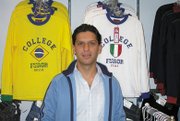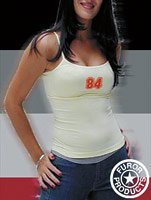Brand Building North of the Border
Mexican label opens retail store in downtown Los Angeles
Raul Bucheli is hoping to break into the U.S. market—and he’s starting in downtown Los Angeles.
The 28-year-old entrepreneur recently opened an outlet of Mexican youth fashion brand Furor Products on Broadway, in the heart of the Jewelry District. The 1,500-square-foot space is the first store to sell Furor’s sexy jeans and T-shirts in the United States.
Bucheli is one of the few Mexican apparel retailers to venture north of the border.
“The Hispanic market is so big, and there are not too many brands of Mexican clothes in America,” said Maria Ballesteros, business editor of Los Angeles–based Spanish-language daily newspaper La Opinioacute;n. “But more Mexican brands and retailers should come. It’s just a matter of time.”
Mexican shoe retailer Gruma Group opened a store in the Plaza Mexico shopping center in nearby Lynwood, Calif., in mid-2003. Mexican supermarket company Grupo Gigante sells clothes in several U.S. stores. But Furor is one of the few Mexican companies to sell a unique Mexican brand in the United States.
While Bucheli’s neighbors sell time-tested native brands such as Levi’s jeans in displays reminiscent of a bazaar, Furor’s Broadway boutique is a neat, well-lit space featuring posters of young Mexican actors wearing the latest Furor apparel. It is a style that would fit comfortably in any upscale American mall, and that’s exactly where Bucheli, president of Furor Products USA, plans to take the Mexican apparel line.
In 2004, he plans to open a second store in Los Angeles County and a store in Chicago, home to one of the largest urban populations of Mexican immigrants in the United States. He also hopes to wholesale Furor to America’s top retailers, including Macy’s and Nordstrom, and forecasts Furor Products USA will earn $2 million in 2004.
Tapping into Furor’s growth
Bucheli’s plans may sound bold for a business launching in an American economy still trying to shake off the doldrums of a weak year, but Bucheli stressed he has seen worse.
“While everyone complains about the economy here, we’d only wish for such an economy in Mexico,” said Bucheli, who has proven his business skills in his home country.
He and business partner Rodrigo Pineirua, also 28, founded denim maker Textiles BP in Mexico City in 1996, after Bucheli graduated from Mexico City’s Universidad Iberoamericana with a degree in industrial engineering with a focus on business.
Textiles BP earned $12 million in 2002 and funded Bucheli’s American boutique.
The company supplied fabric to Furor Products, a Mexico City–based company that manufactures Furor brand jeans and T-shirts for 14- to 34-year-old men and women.
Helmed by Chief Executive Officer Rey Olmedo, Furor launched in 1984 and two years later expanded into the retail game by opening two boutiques in Mexico City. Since then, the company has steadily increased its retail presence and now has 19 boutiques, primarily in central and southern Mexico. Bucheli estimates Furor earns annual sales of more than $100 million.
In 1999, Bucheli, who still owns half of Textiles BP, gained permission from Furor to open three new stores in the Mexico City area. He wanted to open more shops, but the chiefs of Furor Products felt the company—with 17 boutiques and a presence at 200 Mexican retailers—had saturated the Mexican market. This left Bucheli one option for expansion: He had to move out of the country. The only question was where.
Having traveled widely in both Italy and England, Bucheli first considered Europe, but Los Angeles was calling. “America is the Rome of the modern era, and California has the fifthlargest economy in the world and is the home of the most Mexican people outside of Mexico,” he said.
According to the U.S. Census, 44 percent of Mexican immigrants move to California, and Los Angeles is their top destination within the state. The city was an obvious choice for Furor.
It took Bucheli more than a year to secure a lease. Once he had it, he had to jump over the hurdles of American business culture. Bucheli said there is more bureaucracy in the United States than in Mexico, and he estimates labor costs him seven times more than it would in his home country. However, he said the market in the United States is much better. Bancomex economists report the average Mexican immigrant could earn five times what he would earn in Mexico.
Bucheli said 90 percent of his customers are Mexican immigrants and Latinos living near downtown Los Angeles. The remaining customers are non-Latino tourists and people passing by the store.
The look of Furor
They’re buying clothes with a specific attitude. Each year, Furor picks a theme and runs several seasons of the brand through that theme. For example, the theme was “Habana” in 2001, and jeans and T-shirts bore pictures of Che Guevara and a map of Cuba. For 2002, the theme was “Motor Oil,” and race car logos graced T-shirts. This year’s theme was “College,” and the line featured soccer jerseys from Brazil, England and Italy.
Furor produces 30 styles of jeans. The latest boot-cut jeans are named “Morrison” and “Hendrix” after the 1960s rock stars.
Retail prices range from $15 for a T-shirt to $35 for jeans.
Bucheli also hopes to expand the line to include purses and shoes with the Furor Products logo, and he plans to add extra-large sizes to his jeans and T-shirts collections—something his Mexican company does not manufacture.
Until then, he plans to make the first Los Angeles shop a success by placing advertisements on Spanish-language radio stations KLVE (107.5 FM) and Super Estrella (107.1 FM) and by weathering the local economic storms.
“The bus strike was tough for everybody downtown,” Bucheli said, noting that his strike survival plan was simple: He discounted his apparel 10 percent. Furor, he reported, did fine.























